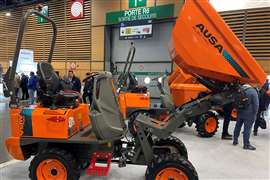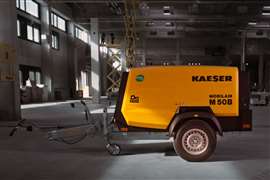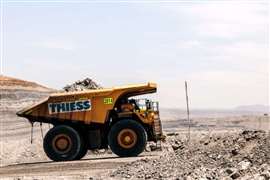Paying your way
02 April 2008
There is ample credit capacity in the market, demand for machines is outstripping supply and rental rates are stable. Then, just when you were beginning to get comfortable, the ‘credit crisis' raises its ugly head.
Memories of the access recession between 2001 and 2003 still linger and, fuelled by newspaper headlines about sub-prime mortgages and housing slowdowns, the industry could be forgiven for becoming a bit nervous. If you don't have a great pile of cash to pay for your next access order –and let's face it who does? – you will need to finance your purchase in another way and, because banks borrow from other banks, the cost of borrowing will increase.
Tony Mort is managing director of AJ Access Platforms Ltd, a UK company whose core business is buying and selling used and new access equipment and which also runs a rental business from three locations in the UK. He does not believe problems will be as bad as they were between 2001 and 2003, but has an underlying feeling that things will be tougher in 2008 than 2007. “The FTSE has already taken a bashing,” he says, “Interest rates in the UK are down a quarter point and confidence has been hit a little.”
But is the increased cost of borrowing going to be enough to send the market into a downward spiral? Alexandre Saubot chief operating officer at Haulotte Group does not believe so, “Companies are in better condition today than they were in 2001; many rental companies have consolidated their business. The weakest players have been absorbed and bought out and the market cleaned up. It is now in a much stronger position.”
Bruce Williams, managing director of Financial Services EAME JLG, agrees, “I would say the dynamics of the current market are very different to those of the most recent cyclical downturn in Europe. European markets have seen a sustained period of stability and growth and business performance. Many JLG customers have put in strong results in the last few years and many have senior management in place that has successfully weathered these cycles before, so should be best placed to deal with any opportunities and challenges that lie ahead.”
Financial balance
One senior figure involved in access finance – who preferred to speak unattributed – told AI that there was speculation in the market that the credit crisis will lead to some rental company failures. He doubted this would be the case because several factors combine to make the market a very different beast from what it was earlier this decade.
Previously many companies had grown their businesses on debt: borrowing heavily and growing rapidly from small to large fleets. While the market is buoyant and cash flow is good then that level of debt can be sustained; when work dries up or interest rates go up the delicate balance is lost and so is the company.
Pointing out the importance of getting financial balance right JLG's Mr Williams says, “When it comes to rental companies, if I were to stress one key item for keeping on top of it, it would be cash flow coverage. Cash is the oil that keeps the business parts moving smoothly, and is something that any business – irrespective of size, scale or reputation – must consistently deliver to survive.”
Companies who did survive the 2001-2003 crash have learnt to be more circumspect, growing their businesses steadily, Mr Saubot concurs “This summer's financial crisis, will not be nearly as devastating [as 2001-2003], not so many [companies] are tied into high risk and low return financial deals. If they are expected to take a high risk they will expect a high return. Haulotte was cautious so we suffered less than some others in the 2001 crisis. Then the market became crazy whereas the potential crisis this summer has had nothing like that effect.”
The particular nature of the access industry may contribute to the ease with which you can get finance. Demand for equipment is high, there are frequently long waiting lists and this contributes to the high value of used equipment. Access equipment can be an excellent asset and valuable security so there is a low risk to lending on it. In addition, access equipment can be used in a range of applications, it is not limited to construction, for example, which means a downturn in one market need not have a catastrophic affect on its rentability.
“[Compared with other construction equipment] access is very highly thought of [by banks and financial institutions],” says Mr Mort of AJ Access Platforms, “it has a high residual value which will continue as long as manufacturers have healthy order books.” He warns that this might change if lead times drop, “I get feedback from different parts of the world,” he says,” and I think that by the second quarter of 2008 we'll be back to reasonable lead times of eight to ten weeks.”
Mr Saubot of Haulotte, has also found banks quite supportive, they can relate to the health and safety issues addressed by access equipment and the fact that used equipment maintains a good value gives them confidence.
Asset finance
A traditional bank may still assess the risk of lending on a piece of access equipment differently from a company or companies providing asset finance. Bruce Williams explains, “Fundamentally there is a difference between the banking view of our sector (which typically looks to financial ratios, balance sheets and cash flow coverage etc), verses an Asset-Finance view which typically looks to the underlying assets being funded, their market worth and their ability to generate cash – particularly critical to rental companies.” He believes that there is room in the market for both views and most well known names combine the approach.
A number of the more prominent equipment manufacturers are becoming involved with asset finance, sourcing and/or arranging finance for customers. Some companies go into a joint venture with a single financial institution, such as the Terex arrangement with De Lage Landen (Netherlands bank); others, like JLG, develop strong partnerships with a number of trusted financial providers. There is no concern in the market that the credit crisis will have any impact on these relationships other than the predicted rise in the cost of borrowing.
Global business
Haulotte's Financing Team has been established for around six years and Mr Saubot thinks that matching suitable finance to a customer's needs is just another arm of the company's service. These arrangements can become quite complex when trying get suitable finance for companies from developing countries where banking maybe local rather than global. “With companies from emerging nations, the leasing agreements can be complex,” he says, “the assets are not always in place but Haulotte can usually find a solution. We are getting very positive results for companies in Eastern Europe and Russia. Every case must be treated individually.”
Mr Williams also acknowledges the challenges of dealing with customers from different parts of the world. “There are huge differences between regions in the way JLG customers operate. This is partially due to regional/cultural differences and partially due to legal/financial frameworks, and of course in major part due to the nature of customer requirements.”
That the access business is global: steadily progressing into developing countries has helped smooth out the affect of the credit crisis. The sub-prime mortgage problems which began the confidence slide will chiefly impact on the US housing market and, although its ripples have been significant enough to disturb the confidence of many major financial institutions worldwide, there are still enough regions where construction is booming.
The general consensus is that in the next five to ten years the market will experience a steady rather than meteoric growth. The credit crisis may have been the catalyst that put the brakes on fast growing market but things may well have slowed anyway.
Mr Saubot agrees that growth will slow but does not think there will be a long term collapse in the future. He is planning ahead and thinking in terms of second replacements, “I feel confident enough to make smart guesses about future business,” he says. “There is still some penetration to be made into Western Europe and a lot of available business in developing countries.”
As the growth curve flattens rental companies will have to get used to the market being stable and this will pose a different set of challenges. Our unnamed senior financial figure said that rental companies may have to keep their equipment longer and drive the fleet hard. They will have the option of differentiating themselves by price or by service. Pricing is a problematic way to go whereas providing good service will bring advantages.
He speculates that companies will either need to be very big: providing good service and benefitting from economies of scale; or smaller addressing niche and bespoke markets. “It is the middle sized companies with between 600 to 1000 units which may suffer. Fleets under 500 or between 2000 and 3000 will be the more successful operations.”
Over the next five to ten years Tony Mort predicts that things will continue along similar lines, “It will be important for users and rental companies to extract as much revenue as possible from machines,” he says. He thinks that successful companies will go for the good quality machinery that will hold its value in the resale market, “There is a perceived quality issue,” he says, “It may just be a case of perception but it's what the buyer thinks that matters.”
Strong character
Could it be that the particular character of the access industry has helped it ride the credit crisis relatively unscathed and made it an attractive prospect to the world of finance? Mr Williams thinks so, “Though we do not live in isolation to the wider economy, the activity and performance in our sectors has been very positive in the last four or five years. I am confident we will see this trend continue – even if at a slower pace at some point – and consequently I would expect continued and possibly even greater involvement from the finance community.”






